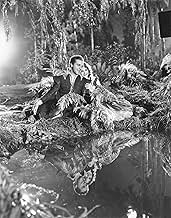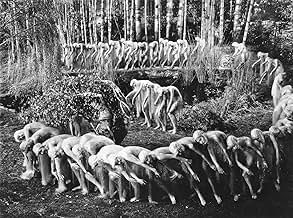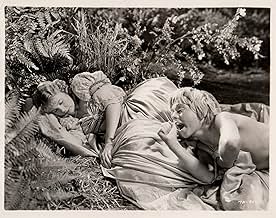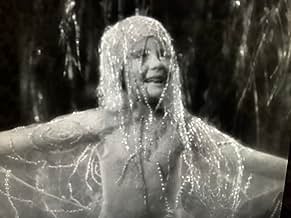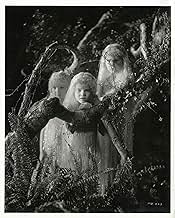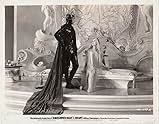NOTE IMDb
6,8/10
4,1 k
MA NOTE
Ajouter une intrigue dans votre langueTwo couples and a troupe of actors have an encounter with some mischievous fairies in the forest.Two couples and a troupe of actors have an encounter with some mischievous fairies in the forest.Two couples and a troupe of actors have an encounter with some mischievous fairies in the forest.
- Réalisation
- Scénario
- Casting principal
- Récompensé par 2 Oscars
- 6 victoires et 2 nominations au total
Olivia de Havilland
- Hermia - In Love with Lysander
- (as Olivia de Haviland)
Nini Theilade
- Fairie - Attending Titania
- (as Nina Theilade)
Avis à la une
10artzau
Thalberg's pledge to give back to the people something good is seen in this project realized 66 years ago. Everyone is acting! No one struts or swains, dying to be a star. The young, superlovely Olivia de Havilland is a gorgeous and fun Hermia in her maiden role. Dick Powell and Ross Alexander as the two Athenian youths confused by Puckish Mickey Rooney Robin Goodfellow are wonderful in their entanglement with beautiful Jean Muir's Helena. The players, Frank McHugh, Dewey Robinson, Hugh Herbert, Grant Mitchell and the wonderful snob's snob, Arthur Treacher are topped by Jimmy ("you dirty rat") Cagney [trivia buffs know he never said those lines except in response to Gorshen and Rich Little's impressions of him at a roast before his death] and Joe E. Brown's Flute. Victor Jory, often cast as a villain is great as Oberon, as is lovely Anita Louise as Titania. There's not a weak spot in this cast and the entire play, in living Black and White, is soft, diffused and whispery as a summer night. Erich W. Korngold's music is supplemented by the exquisite Mendelssohn score and look for a tiny Billy Barty as Mustardseed, one of the sprites. There are other fine ones, the RSC's 1968 and the recent 1999 are wonderful, but, fans, take it from an old Shakespeare buff, this one is an immortal production.
I came across this movie one rainy afternoon on TV. Jimmy Cagney doing Shakespeare? Surely not! My expectations were, frankly, low. We English are a bit funny about Shakespeare, as you can imagine, and the thought of the dirty rat as one of the bard's greatest comic creations was worrying, to say the least. The whole film is, however, magical. I laughed out loud at the wall joke, even though I knew what was coming, and Roony's Puck was, as another contributor says, probably his best performance. Bottom's realisation that he is now the proud possessor of an ass's head is quite affecting. It's Titania's fairies, though, that make this such a wonderful experience. I have seen this a couple of times since that rainy afternoon, and am always convinced that it will not live up to my expectations. It always does, though. The sheer beauty of the scene where the fairies awake is, as we say over here, gob-smacking. I am sure that this could never be done with such picturesque quality in colour. I had this on tape for a long time, and then I lent it to some eejit who erased it. I scan the listings every week to see if it's on TV, and when it is I shall make sure that it never leaves my possession.
Pre-1950 film adaptations of Shakespeare's plays have varied in quality. Some were good and more, especially Laurence Olivier's brilliant 1948 adaptation of 'Hamlet', though that is something to see on its own terms. Others were average or less, with one example being the 1936 film of 'As You Like It', which was very static and stagy and had a badly miscast Rosalind. Had little doubt that this film would be at least above average, considering that the play is one of Shakespeare's best and because the cast is so good.
1935's 'A Midsummer Night's Dream' is a dream. To me it is not just the best screen/film adaptation of 'A Midsummer Night's Dream' (bar none), it is also one of the best film versions of any Shakespeare play pre-1950 and perhaps overall. As well as one of the best adaptations of 'A Midsummer Night's Dream' full stop, for me only the National Theatre Live and Julie Taymor productions are better though once again as standalones. It has very few if any of the things that other early Shakespeare film adaptations did and is full of magic and entertainment value. It's not perfect, but there is so much to adore here.
For one thing, the photography is exquisite and the settings and such are very lavish and rustic. The world one is immersed in being truly fantastical. Also loved the use of Mendelssohn's music, the music itself some of his best loved for good reason (and he was only 16 when he wrote it!) and it is used cleverly and tastefully. Korngold's, one of my favourite film composers, contribution is typically lush and rousing without being over-scored.
The dancing is beautifully choreographed and danced with great grace and elegance, as well as shot and edited in an appropriately dream-like way. The writing is still incredibly funny, without trying too hard, and also beautifully poetic. The story is incredibly charming and told with great spirit, doing nothing to confuse a story that is already quite complicated. The action is opened up enough to not betray stage origins and the atmosphere is suitably magical. The direction is beautifully theatrical, Reinhardt's theatre roots are evident without hurting the drama. The comedy hits the mark, especially with Bottom.
Most of the performances are great, with two exceptions. James Cagney is a sheer delight as Bottom in a role that is so different to what he was usually cast as and shows that he did have a light and funny side to him. Mickey Rooney's performance has left people more mixed, count me in as one of the people that loved his Puck and consider it one of his better performances. The mischievous energy he embodies is infectious. Olivia De Havilland is a charming Hermia and Victor Jory a sinister, amusing and textbook Oberon. Anita Louise's Titania is spirited and regal and Ian Hunter and Joe E. Brown are very good.
Only two performances don't come over as well. One is Dick Powell, who is very bland and too earnest. The other is the very irritating Hugh Herbert, who was always an acquired taste and was very take and leave for me.
Also found the finale on the overblown side.
Concluding however, great. 9/10.
1935's 'A Midsummer Night's Dream' is a dream. To me it is not just the best screen/film adaptation of 'A Midsummer Night's Dream' (bar none), it is also one of the best film versions of any Shakespeare play pre-1950 and perhaps overall. As well as one of the best adaptations of 'A Midsummer Night's Dream' full stop, for me only the National Theatre Live and Julie Taymor productions are better though once again as standalones. It has very few if any of the things that other early Shakespeare film adaptations did and is full of magic and entertainment value. It's not perfect, but there is so much to adore here.
For one thing, the photography is exquisite and the settings and such are very lavish and rustic. The world one is immersed in being truly fantastical. Also loved the use of Mendelssohn's music, the music itself some of his best loved for good reason (and he was only 16 when he wrote it!) and it is used cleverly and tastefully. Korngold's, one of my favourite film composers, contribution is typically lush and rousing without being over-scored.
The dancing is beautifully choreographed and danced with great grace and elegance, as well as shot and edited in an appropriately dream-like way. The writing is still incredibly funny, without trying too hard, and also beautifully poetic. The story is incredibly charming and told with great spirit, doing nothing to confuse a story that is already quite complicated. The action is opened up enough to not betray stage origins and the atmosphere is suitably magical. The direction is beautifully theatrical, Reinhardt's theatre roots are evident without hurting the drama. The comedy hits the mark, especially with Bottom.
Most of the performances are great, with two exceptions. James Cagney is a sheer delight as Bottom in a role that is so different to what he was usually cast as and shows that he did have a light and funny side to him. Mickey Rooney's performance has left people more mixed, count me in as one of the people that loved his Puck and consider it one of his better performances. The mischievous energy he embodies is infectious. Olivia De Havilland is a charming Hermia and Victor Jory a sinister, amusing and textbook Oberon. Anita Louise's Titania is spirited and regal and Ian Hunter and Joe E. Brown are very good.
Only two performances don't come over as well. One is Dick Powell, who is very bland and too earnest. The other is the very irritating Hugh Herbert, who was always an acquired taste and was very take and leave for me.
Also found the finale on the overblown side.
Concluding however, great. 9/10.
The movie is dated, true. In fact, seeing 30's Hollywood's version of Shakespearian England's version of Athenian costuming is a delight in itself. But the actors in this rendition are just amazing. Not only is the cast impressive (Cagney, Brown, Rooney, D'Havilland, Powell), but they are doing the roles with the right mixture of buffoonery and dedication to Shakespeare's love of high and low comedy together.
The casting of Cagney as Bottom was brilliant, his mixture of swagger and obliviousness is perfect, especially when played off of the great Joe E. Brown, who's rubber faced quiet performance is uproarious. Young Mickey Rooney is a wonderful puck, light and athletic, it may be his finest work. The special effects manage to give off the feeling of faerie, without overpowering what is going on. And the weaving of the two stories together works as well as might be hoped for.
I consider this to be the classic definitive Midsummer's Night Dream films. No other can ever measure up.
The casting of Cagney as Bottom was brilliant, his mixture of swagger and obliviousness is perfect, especially when played off of the great Joe E. Brown, who's rubber faced quiet performance is uproarious. Young Mickey Rooney is a wonderful puck, light and athletic, it may be his finest work. The special effects manage to give off the feeling of faerie, without overpowering what is going on. And the weaving of the two stories together works as well as might be hoped for.
I consider this to be the classic definitive Midsummer's Night Dream films. No other can ever measure up.
Since "Shakespeare in Love" made that particular playwright happening and new, check out this, Warner Bros.' wild, expensive, free-wheeling adaptation of "A Midsummer Night's Dream".
For me, James Cagney makes the movie. He's Nick Bottom, the leader (or so he believes) of a traveling troupe of actors. He gives an invigorating performance--the screen is his. At one point, he gets to wear a donkey's head (if you know the play, you know what I'm talking about), but it doesn't faze him in the least. Cagney, the most energetic screen actor, doesn't let his over-the-top approach mar his skill or care with The Bard's great words. It's the test of anyone wishing to act out a part in a Shakespeare play, which Cagney passes, to "speak" the dialogue, and by doing so, make what might be confusing on the page understandable to audiences on the screen or stage.
Warner really spared no expense with this production, which I think might have been the costliest of that year. The whole affair is like a dream in every way--it seems to sway in the wind, fragile to the touch. It features Mendolssohn music, soft-white photography (the great Hal Mohr), and some of the most incredible sets and costumes you're likely to see in a 1930s film.
Nominated for three Academy Awards: Picture, Cinematography and Editing. Bested by "Mutiny on the Bounty" for the first, it won the other two.
For me, James Cagney makes the movie. He's Nick Bottom, the leader (or so he believes) of a traveling troupe of actors. He gives an invigorating performance--the screen is his. At one point, he gets to wear a donkey's head (if you know the play, you know what I'm talking about), but it doesn't faze him in the least. Cagney, the most energetic screen actor, doesn't let his over-the-top approach mar his skill or care with The Bard's great words. It's the test of anyone wishing to act out a part in a Shakespeare play, which Cagney passes, to "speak" the dialogue, and by doing so, make what might be confusing on the page understandable to audiences on the screen or stage.
Warner really spared no expense with this production, which I think might have been the costliest of that year. The whole affair is like a dream in every way--it seems to sway in the wind, fragile to the touch. It features Mendolssohn music, soft-white photography (the great Hal Mohr), and some of the most incredible sets and costumes you're likely to see in a 1930s film.
Nominated for three Academy Awards: Picture, Cinematography and Editing. Bested by "Mutiny on the Bounty" for the first, it won the other two.
Le saviez-vous
- AnecdotesWhen the forest that Max Reinhardt designed could not be lit properly, cinematographer Hal Mohr thinned the trees slightly, sprayed them with aluminum paint and covered them with cobwebs and tiny metal particles to reflect the light. As a result, he became the first (and only) write-in winner of an Academy Award.
- GaffesCorrective lenses were introduced in the 13th century so they could have been worn in Shakespeare's time.
- Citations
Hermia, in Love with Lysander: [to Helena] How low am I, you painted maypole? Speak! How low am I? I am not yet so low but that my nails can reach into your eyes!
- Crédits fousThe opening credits appear as if they were "trickling down" from the top of the screen.
- Versions alternativesThe original 132-minute roadshow version of this film has been restored, shown on cable, and issued on videocassette and DVD. For many years, though, this film was shown only in its general release version, a 117-minute version painstakingly edited by the studio (so that the cuts would not be noticeable), which shifted the order of some sequences and eliminated others.The 2007 DVD release also restores the Intermission title card, not seen since the film's original roadshow release in 1935, as well as including the overture and exit music.
- ConnexionsFeatured in A Dream Comes True (1935)
- Bandes originalesA Midsummer Night's Dream: Overture and Incidental Music
(1826) (uncredited)
Music by Felix Mendelssohn
Adapted by Erich Wolfgang Korngold
Heard throughout the film
Meilleurs choix
Connectez-vous pour évaluer et suivre la liste de favoris afin de recevoir des recommandations personnalisées
- How long is A Midsummer Night's Dream?Alimenté par Alexa
Détails
- Date de sortie
- Pays d’origine
- Site officiel
- Langue
- Aussi connu sous le nom de
- A Midsummer Night's Dream
- Lieux de tournage
- Sociétés de production
- Voir plus de crédits d'entreprise sur IMDbPro
Box-office
- Montant brut mondial
- 2 616 000 $US
- Durée2 heures 13 minutes
- Couleur
- Mixage
- Rapport de forme
- 1.37 : 1
Contribuer à cette page
Suggérer une modification ou ajouter du contenu manquant

Lacune principale
By what name was Le songe d'une nuit d'été (1935) officially released in India in English?
Répondre

